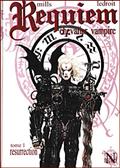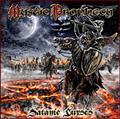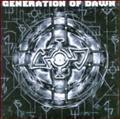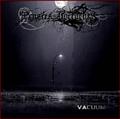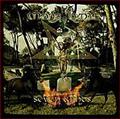ELVENKING (it) - Two Tragedy Poets ...And a Caravan of Weird Figures (2008)
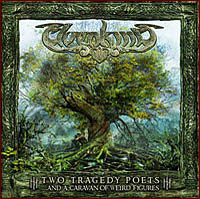
Label : AFM Records / Underclass
Sortie du Scud : 14 novembre 2008
Pays : Italie
Genre : Folk Rock/Metal
Type : Album
Playtime : 12 Titres - 43 Mins
Après un The Scythe qui a dangereusement marqué le lent déclin des italiens d’ELVENKING, je me doutais que la bonne âme qu’est leur frontman et vocaliste, Damnagoras, n’allait pas rester paisiblement assis sur sa fierté et laisser opérer une stagnation certaine. En clair, il fallait que ça bouge ! Un slogan repris d’une manière presque religieuse par les nombreux fans que le groupe à su conquérir au fil de ses onze belles années de présence. Et le changement est arrivé, portant le doux patronyme de Two Tragedy Poets (...And a Caravan of Weird Figures). Je ne sais pas ce qui est le plus bizarre sur cette galette. Son nom ou son contenu ? Peut-être bien les deux puisque dès qu’il s’agit d’innover, Damnagoras n’y va pas avec le dos de la cuillère. Il nous refourgue avec cette sortie un enregistrement totalement… acoustique ! Une expérience qui mérite qu’on y jette une oreille attentive, ne serais-ce que pour savoir ce que contiennent les entrailles des transalpins.
Après un beau préambule, folklorique à souhait et qui n’est pas sans évoquer la vista d’un certain ELUVEITIE, il faut bien admettre qu’ELVENKING retombe dans ses travers. Leur prestation et surtout, sa charpente se révèle friable. Pire ; ce n’est plus du Folk/Power Metal burné mais vide, c’est du Folk Rock sans âme. A base d’hymnes plats, la rondelle contient tous les bons vieux clichés du genre ; guitare sèche maniée de façon robotique, abus des violons (« The Wanderer » pour ne pas la citer !), tempos dansants, j’en passe. Et des meilleurs. Comme cette voix ! Je n’ai que rarement apprécié les vocalises de Damnagoras, mais jamais à ce point… Pour vous donner un ordre d’idée, ses vocaux m’ont régulièrement évoqués le timbre de voix du leader des JONAS BROTHERS. Mielleux, forcés, niais, ils s’adaptent désespérément à la nouvelle orientation choisie ici. De plus, si ce n’est pas un cruel manque d’inspiration que de reprendre deux titres de son répertoire (« The Winter Wake », « The Wanderer ») pour les besoins du palet, ça y ressemble fortement. Fort heureusement pour leur note, ELVENKING propose aussi quelques compositions qui se veulent agréable, à défaut d’être inspirées. Je prends pour exemple le plus flagrant « Heaven Is A Place On Earth » au refrain entraînant. Je serais curieux de découvrir cette piste reprise avec de bons gros riffs, comme ils l’ont si souvent (bien) fait par le passé. Hélas, le cœur à ses raisons que la raison ignore. Celui de Damnagoras et des siens à parlé. Pour ne rien dire.
Je ne reprocherais jamais à un artiste de varier son horizon musical. Seulement aujourd’hui, je constate que si ELVENKING devenait de plus en plus moyen dans son style de prédilection, ils ne sont pas du tout convaincants sur cet essai.
A vite oublier donc…
Ajouté : Dimanche 23 Novembre 2008
Chroniqueur : Stef.
Score :  
Lien en relation: Elvenking Website
Hits: 12907
|



